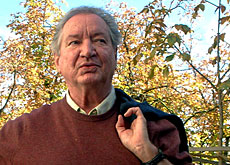Actor believes in entertaining to educate

Swiss actor Roger Jendly has been awarded the Hans-Reinhart Ring for 2006, Switzerland's top award for theatre.
Jendly, whose career has led him far beyond the country’s borders, tells swissinfo he feels theatre can help make people think for themselves.
The French-speaking actor is being recognised for his exceptional efforts in promoting the theatre.
He joins an illustrious group of former winners, who include Benno Besson, François Rochaix and Bruno Ganz. Jendly began acting in the 1960s and his many roles include characters in plays by Brecht, Molière or Tchekov.
He has also acted in 70 film or television productions over the years, including some in German.
swissinfo: The Hans-Reinhart Ring recognises your contribution to Swiss theatre. What do you think that was?
Roger Jendly: I think the first thing was the creation of the Théâtre Populaire Romand (TPR) in 1961 in La Chaux-de-Fonds. There weren’t many professional theatres outside the big cities, and only in Geneva and Lausanne in French-speaking Switzerland. We wanted to take theatre to smaller towns and villages.
At the time it was also a political act. We thought theatre for the people would make them think and change society. We didn’t change the world, but we were only 20 and we accomplished something tremendous by going out and meeting our public. We also did a lot for children.
I spent ten years there before setting up group which did not last long because of a lack of subsidies.
swissinfo: You have done a lot of classical theatre, including Molière’s L’avare (The Miser) this year. You are known for disappearing behind your characters. Would you say this is accurate?
R.J.: I’ve done a lot of modern plays too. It’s true that I have been labelled as someone who vanishes behind the character. But I feel that when someone didn’t realise it was me on stage, it’s the best compliment I could get. That means the character has been given first billing. If you could totally disappear, it would be perfect, especially for someone as shy as me.
swissinfo: Would you describe yourself as a Swiss actor?
R.J.: Yes and no. After leaving the TPR, I decided not to head off to France where I had some work proposals. I stayed in Switzerland, preferring to head abroad only occasionally, as there was enough work and wonderful people here to work with.
But I think it was a good idea to go elsewhere and work with other directors, a positive learning experience. And you have to admit that Switzerland is small. Here people would rather save money than put on plays. That made life difficult for me, so I moved to France in 1988.
swissinfo: You’ve played in as many films as plays. Which do you prefer?
R.J.: Both. I like movies because it’s a different adventure, a different job each time. But my preference is for the theatre because of the contact with a public that can react.
At the movies, everything is cut into chunks and done with a silent background. When I try to do something funny, I always wonder if everyone around has missed the point of it all.
swissinfo: You are now 68, with a wiser head on your shoulders. Do you think theatre still has a future?
R.J.: I believe that by entertaining people you can influence. That’s why I keep on acting.
Theatre isn’t doing too badly either. It’s true that after some really good years, there aren’t as many professional theatre groups because of a lack of funding. But in canton Vaud alone, there are around 40 troupes, most of them amateurs although they work regularly and well. There is still a taste for theatre and there is a public for it. Anyway, we know how to create that need.
swissinfo: You will be the main character in another play next spring. Don’t you think about retiring?
R.J.: An actor doesn’t retire. Of course, a prize like this does make it sound like I’ve reached the end of the road. But Hansueli Moser, the president of the Swiss Theatre Society that awards the ring, told me it was given to honour someone’s career, but only if they kept on working.
So you can see I was completely reassured.
swissinfo-interview: Isabelle Eichenberger
The Hans-Reinhart Ring prize is named after its founder, the poet Hans Reinhart (1880-1963).
Since 1957, it has been awarded each year by the Swiss Theatre Society with the support of the Federal Culture Office.
The choice is made by an independent jury.
Roger Jendly was born in Fribourg in 1938.
He trained in Paris before helping launch the Théâtre Populaire Romand in 1961, spending ten years there.
He then took part in the T’ACT theatre project. Jendly finally headed to France to work in 1988.
He has acted in most major Swiss and European theatres, taking on 70 roles, and about as many in film and television productions.
His films include The Woman from Rose Hill (1989), The Death of Mario Ricci (1983), Jonah Who Will Be 25 in the Year 2000 (1975) and The Middle of the World (1974).

In compliance with the JTI standards
More: SWI swissinfo.ch certified by the Journalism Trust Initiative
You can find an overview of ongoing debates with our journalists here. Please join us!
If you want to start a conversation about a topic raised in this article or want to report factual errors, email us at english@swissinfo.ch.